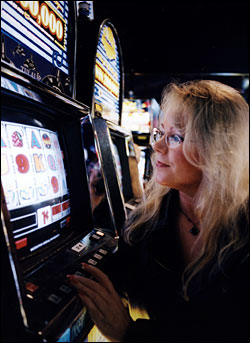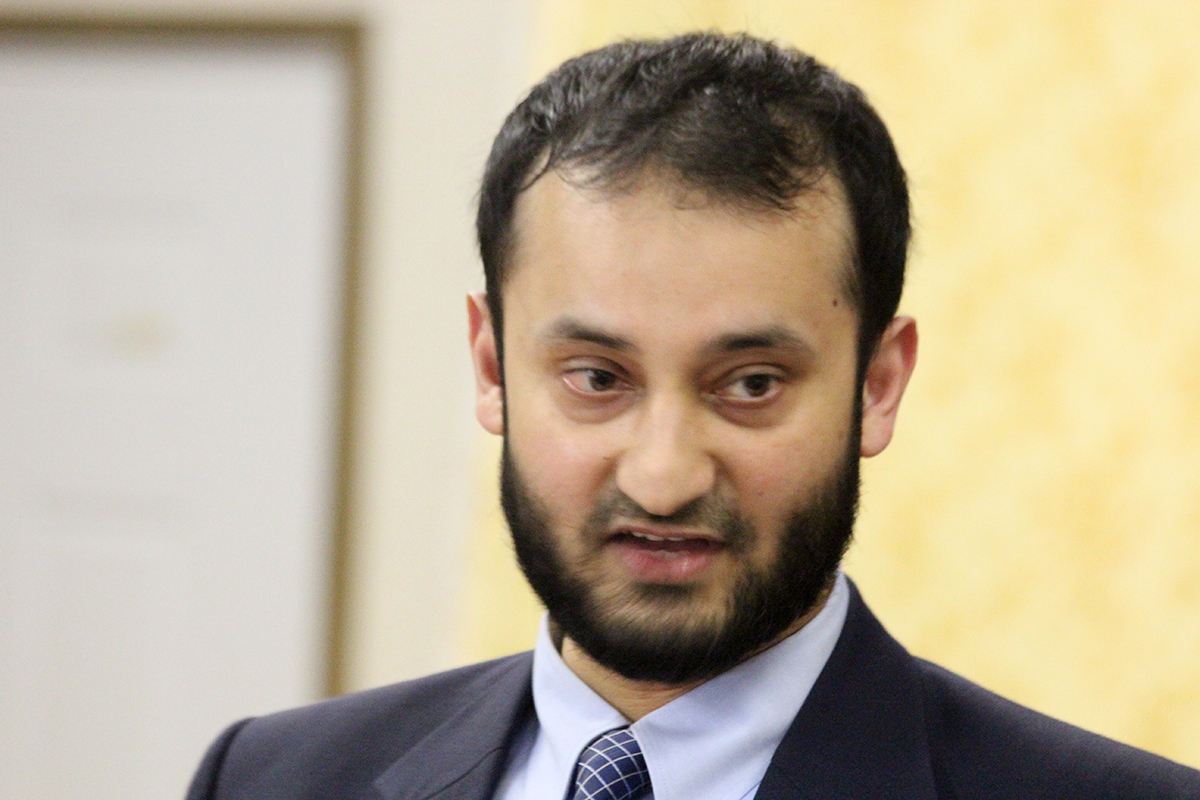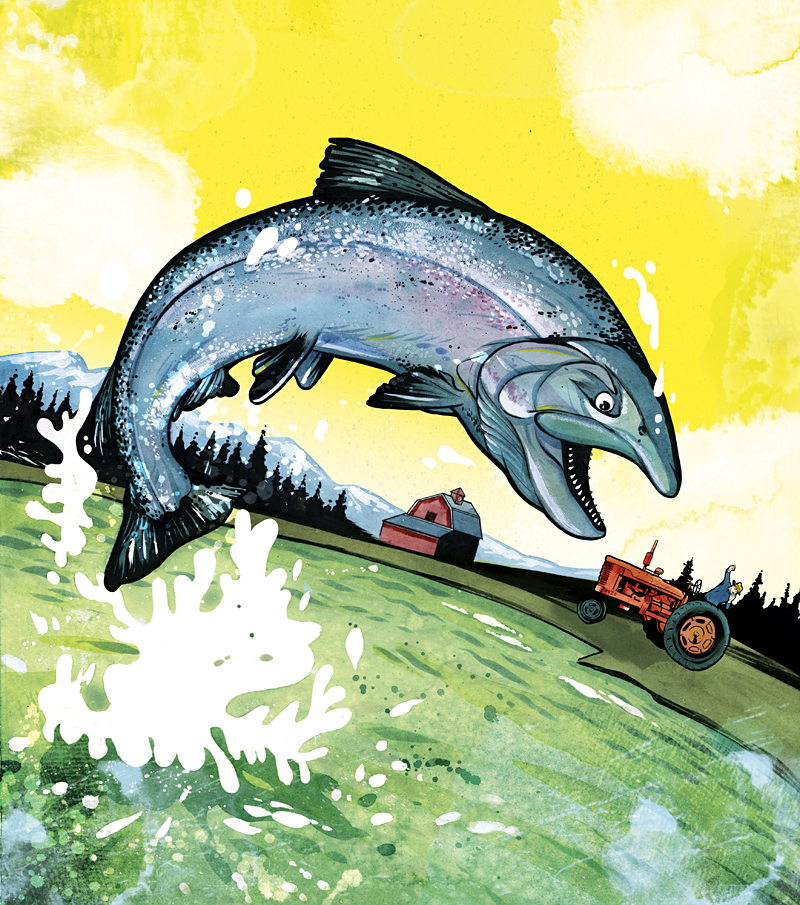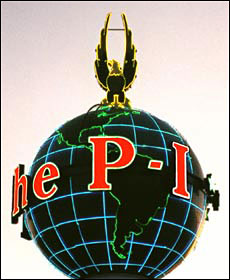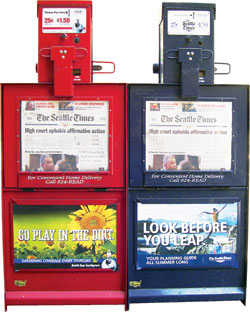An Indian casino manager is gazing through a one-way mirror over the great expanse of the gaming room below and watches as hordes of pale-skinned tourists feed the slot machines. Bright, multicolored lights flash on the video screens, and a frenzied din of bells rises from the casino. He turns to a visitor and smiles.
“Ah, the return of the White Buffalo,” he sighs.
The anecdote has been told and retold in varying versions throughout Indian Country ever since the treaty tribes learned how to leverage their federally guaranteed sovereignty into burgeoning gambling empires. For many of the nation’s tribes, the newfound booty, willingly handed over by millions of gamblers every year, has brought hope and new opportunity.
On the Tulalip Reservation just north of Everett, there are social- services programs the tribe could never have dreamed of supporting 10 years ago. There are preschool programs, art therapy for older kids, a new health clinic and the money to staff it, more jobs, new housing, and full college scholarships to any Tulalip youngster who can make the grade. A reservation that just over a decade ago suffered an unemployment rate of nearly 60 percent now has work for nearly any tribal member who wants a job.
And it is all due to casino gambling. More specifically, it is because of slot machines, the most popularand, some say, addictiveform of gambling yet invented. The Tulalip Casino alone boasts about 1,000 of them. The devices are actually based on the same principle as the state’s scratch ticket games. But the machines are designed to look and act like electronic versions of the one-armed bandits of old. Instead of using coins, gamblers buy tickets that are coded and played until they are exhausted of valueor the occasionally lucky player quits while she is ahead. Ever since the Tulalips and other tribes in Washington and elsewhere in the country won the right to operate Las Vegas-style gambling on reservation lands, the economic fortunes of manybut not alltribes have changed dramatically. Tribal casinos now account for about half of the annual take of the state’s billion-dollar-plus gambling industry. A key factor in the tribal success, however, has been the tribes’ exclusive control of the slots.
“It was the slots that really made the difference,” recalls John McCoy, Tulalip tribal business manager and a Democrat now serving in the state House of Representatives from Snohomish County’s 38th District. “That was when the revenues made a significant leap.”
A big enough leap to draw the attention of non-Indian gambling entrepreneurs, some of them homegrown, others from more distant parts. Together they have become a potent force for expanding state gambling. They want non-Indians to be able to run the same games that the Indian casinos haveespecially the lucrative slotsand they are paying a small fortune in an effort to get there. If they are successful, Indian leaders fear that their still-new grip on economic self-sufficiency could slip away.

Tulalip Reservation: signs of prosperity.
(Jerry Gay) |
A group calling itself the Entertainment Industry Coalition (EIC) is made up of non-Indian owners of mini-casinos, taverns, restaurants, and bowling alleys. A measure introduced at the start of the recent session of the Legislature would give non-Indian businesses the same number of slot machines as are now licensed to tribal casinos.
As the regular session began last January, the EIC forces were given a scant chance of rounding up the 60 percent of both houses that would be needed under state law to approve an expansion of gambling. But as the session adjourned last Sunday without adoption of a budget, and legislators started preparing for the May 12 special session, the EIC found itself with a potent new ally: the Washington Education Association. The WEA was backing the coalition’s slot machine measure as a possible means of getting raises for teachers in the absence of a tax increase soughtunsuccessfully thus farby House Democrats. The campaign is spearheaded by EIC executive director Lincoln Ferris and veteran Olympia lobbyist Vito Cecchi.
Ferris is the former vice president of community relations for Services Group of America, owned by Tom Stewart, the Vashon Island conservative Republican who was handed one of the largest fines ever in a federal election-fraud conviction$5 million. For the past few years, Ferris has operated his own public affairs and lobbying firm representing business clients.
A $300 MILLION JACKPOT?
While many view the tribes sympathetically as underdogs in a battle against big-time gambling interests to protect their prosperity, Ferris has tackled that image straight on. His defense of the EIC case accuses the tribal casinos of causing a decline in gambling revenues to charitable groups and profligate use of tribal funds. He also claims that non-tribal gambling would pay taxes that the Indian casinos don’t have to pay, generating more revenue for the state in tough budget years like this one.
But tribal leaders counter that as sovereign governments, they have their own use for casino revenues.
“All of our revenues are a tax base,” says Ron Allen, leader of the Jamestown S’Kallam Tribe. “We have pointed out that Indian communities have suffered at the lower end of the totem pole when it came to funding for our communities.”
There have been the inevitable dueling polls. A poll commissioned by the Tulalip Tribe reported that 40 percent of those surveyed favored expanding slot machine gambling to non-tribal operators, with 55 percent opposed. The EIC poll, however, reports that some 70 percent of its sample supported the principle of “fairness,” or equal opportunity for slot operations for non-Indians.
“It is a complicated issue,” says Ferris. “We did a good job of educating people in the off-season. People are going to gamble. Our answer is, if you are going to have gambling in the state, let’s regulate it and tax it.”
But nothing seems more promising to the EIC’s chances of getting its slot machines than the state’s horrendous budget crisis and a weary, frustrated Legislature trying to plug a nearly $3 billion hole in the biennial budget without raising taxes. Ferris has been pitching hard in his talks with legislators on non-tribal slots as a partial answer to the state’s budget woes. Gambling opponents are appalled, conjuring images of the state turning into another Nevada with all the sleaze that comes with it. King County Prosecutor Norm Maleng, heading up Citizens Against Expanded Gambling (CAGE), a group of ex-governors and local officials, has railed against the effort to expand gambling in the state.
While tribal leaders’ biggest worry is that expanded non-tribal gambling, particularly with the slots, will undermine their financial base, Ferris and the EIC claim that the Washington gambling marketplace is big enough for all. The state Gambling Commission puts the current figure for net gambling income at just over $1 billion a year, counting estimated tribal casino income. The EIC claims that the market would at least double under its proposal.
But that, again, is one of the reasons for CAGE’s opposition, says Maleng: “We don’t want to see it increase.”
Noses have been counted and recounted in the Legislature, and until last week, it appeared that the pro-gambling forces were likely to fall short of the necessary votes.
But as the legislative session wore on, the ground began to shift. House Democrats were forced to drop a proposal for a sales tax increase that would have produced about $300 million in revenues over the next two years. Interestingly, that’s about the amount that the EIC’s Ferris claims would be raised under a revised version of the coalition’s slot machine bill.
“We’re still in play,” says Ferris.
PROTECTING THE ‘BLACK HILLS’
Money and politics are like fuel and flame. And gambling has always had a way of turning the heads of Washington state politicians. There have been times when its siren call lured some of our less principled public servants to their ruination. Envelopes of cash stuffed into the pockets of a few state legislators by shadowy men seeking to influence votes in favor of legalization of casino gambling led to the indictments of two prominent state legislators and a lobbyist in 1980 in the scandal called “Gamscam.” The shadowy figures turned out to be federal agents running a sting operation. Although some charges were later dismissed on appeal, the case served as a cautionary tale for any Washington politician who might engage with gamblers.
The EIC and its allied group, the Recreational Gaming Association, headed by lobbyist Cecchi, spent more than $600,000 between 2001 and the 2003 legislative session on lobbying and campaign contributions to bring about their stated goal of “parity” with Indian casinos. The coalition’s contributions to legislative candidates for the 2002 elections made it one of the top-spending PACs, exceded only by the WEA, at about $650,000.
The tribes have done some heavy spending of their ownroughly $400,000 over the past year aloneto protect their exclusivity. The Tulalip’s McCoy saw the effort as something akin to the white man’s invasion of the Black Hills of South Dakota in the early 1870s after gold was discovered on the lands that had been ceded to the Sioux by treaty.
“As soon as the Indian gets something good going, here they come to take it away,” he muses.
McCoy is one of a handful of Tulalips of his generation who were able to escape the poverty of the reservation for a better life. He was born on the reservation but spent much of his boyhood with his Navy father at various West Coast bases. He joined the Air Force in 1961 and trained as a communications operator. After retiring from the Air Force, he went to work for Sperry Univac and worked his way up in management ranks. In 1994, McCoy returned to the reservation as business manager.
McCoy’s successful campaign for the state House of Representatives last year was also a triumph of sorts for the Indian community as a whole. Legislative historians believe that he is the first full-blooded Native American to be elected to the state Legislature in more than half a century. His list of campaign contributions included thousands of dollars from tribal groups both inside and outside the state.

Tulalip Montessori student Terrel Jack.
(Jerry Gay) |
McCoy said Monday that he was “extremely disappointed” at the WEA’s move to back the slot machine proposal. He said that he supports the teachers and would like to see them get the raises they won with the 2000 initiative campaign, but “in the current climate, we just don’t have the money.”
“Balancing the budget on gambling is just bad policy,” he said without a trace of irony, but added that with the caucuses “split right down the middle” on the slot machine measure, the 60 percent vote needed for passage will still be tough for the EIC.
As the EIC remains alive, McCoy is in the thick of the fight. What he and other tribal leaders fear is that the non-Indian gambling industry will more than double the number of slot machines in the statenow at about 10,000 out of an authorized 18,000and dilute the market advantage the tribes enjoy. They also point out that the “fairness” issue raised by the EIC is bogus”apples and oranges,” says McCoy. The Indian casinos are run through their tribal governments, and the proceeds from those casino operations are, by federal statute, designated for the benefit of the tribe as a whole.
While the tribes don’t pay certain state taxes that non-Indians do, they also don’t receive many of the benefits of other citizens. The tribes must finance much of their own infrastructure. Casino revenues help build roads, pay for tribal police and fire services, and finance housing, health clinics, and other public services. Sometimes casino profits become direct cash payments shared with individual tribal members. In a still-controversial move, the Puyallups distribute $2,000 a month to their tribal membersa practice that the EIC says makes them no different than shareholders in a profit-making enterprise receiving their dividends. Tribal leaders say that as long as all members of the tribe benefit equally, the manner and means of the distribution of casino revenues is their own business.
While there is always significant resistance to allowing gambling to expand in the state, there is another point of view that favors a virtual Indian monopoly on casino gambling and slot machines. It is a view that holds that the tribes, after a hundred years or more of getting the shaft from government, are entitled to some payback.
“Native Americans have historically been taken advantage of, and gaming has presented an opportunity for the tribes to do some good for themselves,” says Ron Dotzauer, public affairs consultant to the Tulalip Tribe. “The public in this state doesn’t want expanded gambling. For those who want to gamble, we already have a well-functioning, well-regulated model, geographically dispersed throughout the statethe tribal casinos.”
‘NO MORE GAMBLING, PERIOD’
Ironically, one of the most influential allies the tribes have in their current battle to hold on to their exclusivity in the casino business is someone who opposed the early Indian casinosNorm Maleng.
“The people of Washington don’t want any more gamblingperiod,” Maleng declared last week before a rally on the state Capitol steps. “Not a so-called little expansion of the state lottery. Not video slot machines in taverns and bowling alleys. And especially not another taxpayer-financed task force to study ways to expand gambling.”
Maleng’s group, backed by 30-some-odd municipal and county officials from around the state, opposes expanded gambling largely on policy grounds. Maleng has pointed out any number of times that once a certain gambling activity is allowed, it never is rescinded. The group believes that it is bad fiscal policy to build a dependence on gambling revenues into a state budget.
“If gambling is a bad idea in good economic times, it’s an even worse idea in bad economic times,” he says, noting the proposal that some revenues would go to schools. “And using the education of our children as an excuse for expanding gambling is cynical at best. Gambling is a complex public-policy issue. Why is it always brought up as a budget issue? It’s a policy issue first and foremost. Gambling expansion always comes with economic, criminal justice, and social consequences.”
Many agree with him. Maleng’s group also has the bipartisan backing of Washington’s ex-governors, including Mike Lowry, Booth Gardner, Dan Evans, John Spellman, and Albert Rosellini.
While Ferris and the EIC like to emphasize the benefits of their slot machine measure for such groups as charities, “mom and pop” taverns, and other small businesses, the big guys are, nonetheless, licking their chops over their prospects. They already own many of the house-banked mini-casinos in the state and would be at the front of the line if and when slots were legalized for non-tribal operations. “House-banked” means that the operator underwrites payouts to players, enabling higher stakes games than would be possible when the pot is limited to betting by the players. The Legislature in 1997 approved house-banked card rooms, whose owners had complained that they needed the boost to compete with tribal casinos.
The biggest mini-casino operator in the state these days is Tim Iszleyowner of the Silver Dollars casinos of Mountlake Terrace, Tukwila, SeaTac, and Tacoma, the Golden Nugget of Shoreline and Tukwila, and the Hideaway of Shoreline. A new presence in the state is Great Canadian Gaming, which last year purchased Big Al’s Casino in Everett and has opened a new casino, the Grand Central, in Tukwila. The company says it expects to open two more casinos later this year. “If things are so tough here for non-tribal gambling operators, why are these guys buying in?” asks McCoy.
The quick answer is that they are waiting for the slots, which they see as an inevitabilityif not this year, later, but inevitable all the same.
SWEETENING THE POT FOR SLOTS
There are some two dozen tribal casinos in the state, most of which offer slots in addition to their full complement of table games. Most of the tribes have been able to parlay their gaming largesse into vast improvements of social-services programs and reservation infrastructure long neglected because of the lack of support from state and federal governments. That neglect was always one of the by-products of tribal “sovereignty”; the reservations have historically been islands of poverty.

Tulalip Casinos Chuck James: We are training our next generation of leaders.
(Jerry Gay) |
Congress passed the Indian Gaming Regulatory Act in 1987, which set the stage for compacts between the individual states and the tribes. Under that law, any games of chance that were permitted in a state, however infrequently, had to be approved for Indian casinos. In Washington, as long as charitable groups were permitted occasional “Las Vegas” nights, offering big-time table games, the Indian casinos could offer the same games year-round. In the years before Indian casinos began to proliferate, there were unsuccessful attempts at eliminating the charitable gambling that created the opening for Vegas-style Indian casinos. There would be a great cry over the fate of the poor and worthy charities that would be forced to operate without the revenues that only roulette, blackjack, and craps would bring to their good works. But in the background, always, would be the professional gambling interests working to make sure that the fig leaf provided by the charity groups was not snatched away.
The success of tribal casinos has hinged in large measure on being, literally, the only games in town.
The EIC measure, as originally proposed, would have made more than 18,000 new slot machine licenses available in the state, matching the number available to the tribal casinos. The machines would be privately owned and operated, and the state would get 20 percent of the revenue they generated and the cities would get 5 percent.
But to become law, the measure would take a 60 percent vote of both houses, and opponents took some comfort in the unlikely prospect of that happening. Senate veterans like Margarita Prentice, Democrat of South King County’s 11th District, vowed that the bill would die aborning.
Ferris, however, remained enigmatic and optimistic beyond what seemed to connect with the reality of the supermajority needed to win.
Even as states are required by federal law to negotiate in good faith with tribes over gambling rights, there are ways that they can exercise some control and, for that matter, leverage over tribal gaming. Federal statute holds that any form of gambling allowed by a state, regardless of how infrequent, must be allowed the tribes. State legislatures can vote to eliminate gambling allowed to non-Indians and thus force the tribes to give up their own games. But history shows that states generally don’t cut back on gambling once it is in place. A spokesperson for the Washington, D.C.-based National Coalition Against Legalized Gambling says that only two states have ever reduced gambling out of the three dozen that have some form of legalized gambling.
McCoy was feeling good about the chances of burying the EIC slot machine measure but predicted that Ferris would make a move toward the end of the legislative process.
“My guess is that they are going to wait for the bitter end to drop it [the slot bill],” he said.
The bitter end was approaching last Sunday as the Legislature adjourned from the regular session and, having failed to adopt a budget, was headed for a special session. And the EIC bill, which some legislators have declared dead on arrival several times in the past few months, was still afloat. What was DOA for certain was the House Democrats’ sales tax hike.
Key changes were made last week in the EIC-backed measure while it was incubating in committee. Ferris says the EIC is now offering a 28 percent share to the state instead of 20 percent and would agree to let the state Lottery Commission control the slots through a central computer. Ferris claims that the new package would raise as much as $280 millionalmost as much as the sales tax increase the House Democrats wanted but couldn’t get.
Sen. Prentice remains adamant that the slot machine bill will fail. She also sits on the state Gambling Commission as an advisory member who is, by her account, the first legislator to attend gambling commission meetings on a regular basis. She also has 10 card rooms in her 11th District. She is displeased with the EIC.
“I’ve been so fair to these guys,” she said. “I’ve defended them when people made unfair allegations. But they’re getting too grabby.”
Prentice insists that the gambling debate is “not about the tribes, it’s about what kind of state we want to have. It’s about policy.”
The tribes have a huge stake in the outcome of the proceedings. The Tulalips have invested nearly $100 million in the construction of a glitzy new casino expected to open early this summer on the north side of their Quil Ceda shopping center near Marysville. The Puyallups are spending more than $200 million for a new casino next to I-5 in Tacoma. It will include conference facilities and a 250-room hotel. Several other tribes are also building new facilities.
But some tribes, like the Tulalips, are looking past the immediate boon of gambling revenues, which they know could disappear at some point in the future, either through competition from non-Indian operations or even an unlikely move by elected leadership to ramp back on state-approved gambling.
McCoy has few illusions about the long-term viability of a tribal economy based on gambling. “We can’t take anything for granted,” he says. The Tulalips are working hard to diversify their assets. The Quil Ceda Village near Marysville houses a Home Depot the only one between Everett and Bellinghamand a cavernous Wal-Mart. The tribe is eyeing other investments as well.
Chuck James, 62, a former steel industry executive and full-blooded Tulalip, is manager of casino operations for the tribe. Although he left the reservation as a young man, he has returned for good.
“When I was a boy here, there was no prospect for success,” he says. “Now we are training our next generation of leaders and managers.”
James believes that the business and management skills that the tribe’s emerging generation of leaders are acquiring in casino operations will transfer to other enterprises as the diversification of the tribal economy increases over time.
Brian Cladoosby, leader of the Swinomish Tribe, which operates the Northern Lights Casino near La Conner in Skagit County, says the casino revenue isn’t just about cash flow.
“For the first time in the history of many tribes, they are working toward becoming asset managers,” he says. “Before the casinos, we always had to manage from a debt standpoint. Now when we go to the bank, the bankers listen to us.”
